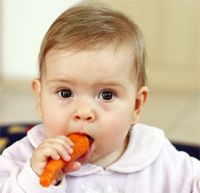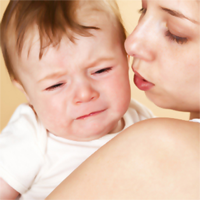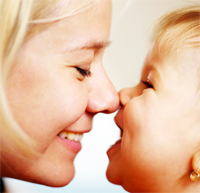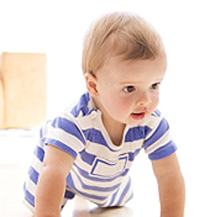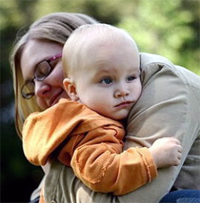Take care of yourself You know the saying, “If mom isn’t happy, nobody’s happy?” It’s true. Whether you’ve just given birth or adopted a child, life will be amazing but also overwhelming. Your first priority will be taking care of your new baby, but don't forget about yourself. Take a walk, read a book — even if it takes a week to get through one chapter — or get a pedicure. If you exhibit signs of postpartum mood disorders, don't hesitate to get professional help. Let someone else tackle your to-do list When someone wants to visit you and the baby and asks, "Do you need anything?" the best answer you can give is "yes!" Less time walking the dog or cleaning means more time with your baby. You may want to hire a postpartum doula — a professional trained to "mother the mother" by helping with things like breast or bottle feeding support, cooking light meals and answering non-medical baby care questions so you can rest, recover and get comfortable with your new baby. Get to know your baby’s cues. You may not know exactly what your baby needs right away, but you will get to know your baby’s cues and what they mean. The “feed me” cry, the “change my diaper” cry or the “I just feel like making noise” cry — pretty soon you’ll understand this new baby language. Go on a baby's day out. Don't fret about getting your baby on a schedule — the more you involve him in your day-to-day life, the more comfortable you'll both be. Take him to the coffee shop, out to lunch or for a walk in the park. If you're nervous about nursing in public or what to do if your baby decides to have his first screaming fit in the middle of the mall, take a deep breath. Every new mom goes through this and gets through this. You will, too.
1. Lack Of Sleep : Most kids suffer from insufficient sleep during different developmental stages. Getting tired occasionally due to lack of sleep on the previous night is normal, but danger signals ring when your child gets tired on a regular basis, due to improper sleep pattern. Put your child to bed one hour earlier than the previous week and see the effect. 2. Lack Of Proper Nutrition : Inadequate or improper nutrition adds up the causes of fatigue in children. Your child may not be getting the essential vitamins and other nutrients required by the body. Junk food like French fries, burgers and pizzas do no good to a child’s body. Add to this is the risk of obesity. Do away with the junk and make your child eat a healthy nutritious diet. 3. Lack Of Exercise : Lack of proper exercise can make the child inactive and more prone to tiredness. Wake up your child early so that he/she is off the couch. Hit the outdoors, along with your kiddo and play a sport or get going with some exercises to refresh the two of you. In no time, you would notice the change in the energy levels of your child. 4. Depression/Stress : Unlike a popular belief that only adults suffer from depression, kids, too, experience stress in their daily lives due to a number of reasons. A major distress or disturbance in the family, such as divorce or death can be the reason behind your child’s lethargic behavior. Mounting pressure in school or the need to excel in every class test can also make your child stressed out. In such cases, you must consult a therapist for your kid. 5. Anemia : Anemia is another major reason for fatigue in children. Anemic children are more likely to complain of tiredness, due to lack of iron in their blood. These children are easily fatigued, since the amount of oxygen that reaches the brain reduces considerably, due to anemia. 6. Too Many Activities : In case you are thinking that by keeping your children involved in work, you are keeping them out of trouble, think again. Your kid is likely to suffer from fatigue due to too many activities. Consider the activities delegated to your child once again. Observe for a week and see the difference in the attitude of your child and his/her ability to function. 7. Air Quality : Air quality is a surprising cause of fatigue in children. The child’s energy is reduced to zero, if he is exposed to unclean air. Keeping your children away from the blazing sun is a good way to restore their energy levels. Use an air purifier at your home if the air quality of your house is poor. Adding plants in your home is yet another option you can explore, as they are a good source of healthy air.
1. Your child should preferably sleep in his own crib. Bring him next to you only if he wakes up and cries or wants to be fed. Remember, don't breastfeed him when he's sleeping. 2. Don't smoke in your child's room. If you have a balcony, convert your home into a no-smoking zone and smoke only in the balcony. 3. Use a firm mattress. The mattress should be exactly the length of the crib base. There should be no space where your child's head can get stuck, or he may get smothered. 4. When placing your child in the crib, cover him with a light blanket, even in the summer, if you are sleeping with the air-conditioner on. Make sure that his head is never covered with the blanket or sheet. 5. Make sure the sheets are clean. 6. Keep a soft light on, next to his crib. 7. No matter how adorable your baby looks surrounded by soft toys and stuffed animals, it's best to avoid placing them inside his crib, especially when he's sleeping. 8. Never ever put your infant to sleep by placing him on top of a pillow. 9. Similarly, avoid putting your child to sleep on a sofa. His head may slip in between the crevices, causing him to suffocate. 10. Don't put your infant to sleep on his stomach. 11. Make sure your child's room is well ventilated. 12. If you are both working parents, you may feel better at the thought of spending time with your child at night by sleeping with him. This encourages parent-child bonding. However, don't bring your child into your bed if you are intoxicated on alcohol, doped or heavily sedated for any reason. You should be in such a frame of mind, that you are able to respond to your baby's slightest movement. 13. Don't put an infant (less than ten months) to sleep on an adult bed with another sibling, especially if the sibling is just a couple of years older. Young children are unaware of the dangers of suffocation. Make sure that if your infant sleeps out of his crib, he sleeps with an adult. 14. If your child is in your bed, don't cover him with your quilt. Place him in his own baby blanket.
At birth: It is important to give certain vaccinations right after the birth. This includes BCG vaccination for tuberculosis, Oral Polio Vaccine(OPV) for polio and the first dose of Hepatitis B. The doses of OPV and Hepatitis B should be continued and the next dose will be in the 6th week. 6 Weeks: First dose of DTP for Diphtheria, Tetanus and Pertussis, Oral Polio Vaccine, First dose of Haemophilus influenza , Second dose of Hepatitis B, Rotavirus(optional) and Pneumococcal Conjugate Vaccine(optional). Rotavirus and Pneumococcal Conjugate Vaccine are not compulsory vaccinations. But, those who travel out of India may have to take these vaccinations depending on the vaccination policies of the particular countries. 10 weeks: Second dose of DTP for Diphtheria, Tetanus and Pertussis, Oral Polio Vaccine, Second dose of Haemophilus influenza, Second dose of Rotavirus (optional) and Second dose of Pneumococcal Conjugate Vaccine (optional). The dose of Rotavirus vaccinations includes two or three doses depending on the brand of vaccine you select. If you opted for vaccination having two doses, then by the 10th week you will finish the full doses. But, if you opted for vaccination with three doses, then the next dose should be at 14th week. 14 Weeks: Third dose of DTP for Diphtheria, Tetanus and Pertussis, Oral Polio Vaccine, Third dose of Haemophilus influenza , Third dose of Pneumococcal Conjugate Vaccine (optional) and Third dose of Hepatitis B. 9 Months - 18 Months: Measles, Hepatitis A, Mumps Measles Rubella, Varicella, DTP (Diphtheria, Tetanus and Pertussis) and Oral Polio Vaccine. The second dose MMR vaccine can be given at any time 4 - 8 weeks after the first dose. Varicella second dose can be given any time 3 months after the first dose. These are the important vaccinations that you should give to your baby. It is important to consult your paediatrician before administering any kind of vaccination. Giving vaccinations to your baby at the right time will help them to be immune throughout their life.
పిల్లలకు సక్రమమైన ఆహారపు అలవాట్లు ఉండడం అవసరం. వేళకు భుజించటం, వేళకు నిద్రపోవడం వంటి మంచి అలవాట్లు ఉన్నట్లయితే ఆరోగ్య సమస్యలు తలెత్తవు. అయితే కొంత మంది పిల్లలు ఆహార నియామాలను పట్టించుకోరు. అతిగా తినటమో లేదా డైటింగ్ పేర అసలు తినకపోవటమో చేస్తూ అనారోగ్యాలు కొని తెచ్చుకొంటారు. సక్రమమైన పద్ధతిలో ఆహారం తీసుకోకపోవట మన్నది అబ్బాయిల్లో కంటే అమ్మాయిలలోనే ఎక్కువ. ఇది పిల్లలకే కాక పెద్దలకు వర్తిస్తుంది. పిల్లలకు సక్రమమైన ఆహారపు అలవాట్లు చేయవలసిన బాధ్యత తల్లిదండ్రులపై ఉంది. పేచీలు పెడుతున్నారు కదా అని చెప్పి అన్నం పెట్టడం మానేస్తే అదే అలవాటైపోతుంది. పిల్లలు తక్కువ ఆహారం తీసుకోవడానికి అలవాటు పడిపోతారు. శరీరానికి అవసరమైనంత మోతాదులో ఆహారం లభించకపోవడంతో బలహీనంగా తయారవుతారు. కాబట్టి పిల్లలకు అవసరమైనంత మేరకు ఆహారాన్ని ఇస్తుండాలి. పిల్లలకు ఒకే రకమైన ఆహారం ఇవ్వడం వల్ల కూడా వారు ఆహారం సరిగా తినరు. అందువల్ల తరచు ఆహారం మార్చడం అవసరం. కొత్త రుచులు, కొత్త వాతావరణం కూడూ పిల్లలు బాగా ఆహారం తీసుకోవడానికి దోహదం చేస్తాయి
Breastfeeding is one of the most effective ways to reduce the amount of bilirubin in the blood of the newborn, because mother's milk contains some of the important nutrients required for the development of the baby's functional organs. Breast-feed your baby every two hours post birth. Frequent feeding can help the baby pass the excess bilirubin through his poop and thus, reduce the jaundice symptoms. Sunbath is an effective remedy to treat jaundice in newborns. Remove the clothes of your baby and place him/her under direct sunlight or in a warm room for about 10 minutes. Lay your baby on a blanket, under the window, so that the sun's rays bathe his/her entire body. Be sure to block your newborn's to avoid direct sunlight. The best time to sunbathe the baby is early morning hours, between 7 am and 8 am. In case the levels of bilirubin in your infant's blood are high, the doctor will administer phototherapy to treat the problem. During the treatment, your baby will be monitored under 'special lights' at the hospital, for 24 hours or 2 days. The special lights will eliminate jaundice by reducing the bilirubin levels. Another way to treat jaundice in newborn is to substitute breastfeeding with formula. Depending upon the level of bilirubin in the baby's blood, the doctor may suggest to feed the baby on a formula (similar to mother's milk), for about 48 hours. After the bilirubin levels are back to normal, the physician would suggest to switch back to breastfeeding.
పసితనం నుండే పిల్లలకు షాంపూల వంటి రసాయన పధార్థాలను తలస్నానానికి వాడటంవల్ల, ఫ్రిజ్ లలోని అతి చల్లని పధార్థాలను తినిపించడం వంటివి చేయడం వలన పిల్లలకు పసితనంలోనే వెంట్రుకలు తెల్లబడుతున్నాయి. ఈ విధంగా పిల్లలకు తెల్ల వెంట్రుకలు అవకుండా ఉండాలంటే ఒక చిన్న చిట్కా ఉంది. అదేమిటంటే... అయిదు నుండి పది ఎండి ఉసిరికాయముక్కలు ఒకగిన్నెలో వేసి మునిగే వరకు నీళ్ళుపోసి మూతపెట్టి రాత్రంతా నానపెట్టాలి. ఉదయం నీరు తీసి వేసి ఆ ముక్కలను నేతితో చిన్నమంటపైన దోరగా వేయించి, ఆ ముక్కలను పిల్లలతో తినిపించడం గాని లేదా అన్నంలో కలిపిపెట్టడంగానీ రోజూ విడవకుండా చేయాలి. ఇలా ఆరునెలలు చేస్తే పిల్లల తెల్లవెంట్రుకలు పూర్తిగా నల్లబడుతాయి.
Symptoms : Most colds are nothing less than an unnecessary trouble. However it is important to note the signs of your baby when he/ she develop cold. Here are some common symptoms to check out for when your baby has cold. *The first sign of cold is usually a runny nose followed by sneezing and coughing. *Your baby may get fever due to infection. *There may be congestion of nose which may in turn lead to breathing problems. *Will refuse to nurse or show lack of appetite. *Become cranky, irritable and lethargic. Remedies : Sadly there is no known cure for common colds. Even the antibiotics don’t help much when it comes to treating colds. The best way you can help ease your baby’s discomfort is to keep him as warm as possible and consulting a doctor if your baby is below three years of age. *If your child has fever, you can give him Tylenol or Ibuprofen. Never give aspirin to your babies as it can trigger other complications. Also avoid giving any medicines to your little one if he/ she is vomiting or dehydrated. *It is important to keep your child hydrated when suffering from cold. Keep feeding him with fluids to avoid dehydration. If you are nursing, it is an added advantage since apart from keeping your child hydrated, breast milk is believed to offer extra resistance against cold causing viruses. *Keep your baby’s nasal passage clear to help him get over any breathing difficulty. You can use nasal aspirator with saline nasal spray to clean the passage and offer relief.
One of the primary concerns of parents is not being able to handle a child all by oneself or being emotionally unprepared and economically inadequate to support the new arrival. Adoption helps to slake off these concerns and avoid all agonies of pregnancy termination and ensures the mother of a safe, happy, and stable upbringing for her child. Another positive point about child adoption is that the ultimate say often rests with the biological parents. They have the liberty to interview potential parents, review the paperwork and even inspect the homes and family environment before giving away their offspring. The biggest beneficiary in the adoption process is often the child who is saved from the torments of a bad life or ends up in an orphanage. By adopting a child, one can offer him or her both emotional and economical support. Apart from fulfilling the child’s emotional, physical, and psychological needs, adoption can offer the child a homely environment with better educational prospects. Adoption is possibly the best alternative for childless couples who cannot conceive biologically or do not wish to opt for artificial insemination. Adoption is the best answer to infertility issues. For most women who cannot conceive a child, adoption is the second best way to go through the joys of pregnancy and motherhood. Adopting a child not only fills the vacuum in the life of childless couples, but also helps them to offer a family life to a homeless child. There is no bigger noble deed than adopting an itinerant child and giving him a safe, secured life. One of the biggest advantages of adoption is that even the parents of a child can adopt an abandoned child and give him or her the joys of parenthood and love. By adopting a child, you can make a big difference to his or her life and build their future as well.
1. The closets, benches, racks and shelves should be kept at a height and place that is easily accessible by the babies. If the things in the room are well organized, it will organize the kids as well. 2. You can create a continuous art pattern in the room by using wainscoting and by painting the wall below by chalkboard paint. You can use colors of your choice and paint up to a chair rail. 3. Use paints that glow at night. There are stars and moon patterns available for the ceilings, or cityscape for the edges of the room. This will get your babies excited to switch off the lights early at night. It will also make your child love sleeping in the room. 4. Temporary wall tattoos and removable wall transfers have become very popular and affordable. They come in different colorful patterns. Your kids will have fun decorating the room the way they want to. 5. Kids like hanging stuffs, they are also good collectors. Let pictures and postcards hang down in front of window or clip them with strings along the wall to create an interactive border in the room. 6. Kids like display space where they can put up their recent art work for their spectators. Galvanized metal is easily available at any home improvement store. This will give an instant magnetic board for your kids to put on stuffs. 7. Check your local art shop for peel and stick cork. You can cut them into any shape and attach them to any part of the wall to provide a colorful look. 8. You can use different charts to border the walls and use non-toxic paints to put your child’s handprint on the borders. 9. Use multiple lighting in the room and not just one monotonous lighting system. Overall lighting is necessary and so is the reading light. The room should be well lighted with lights at the required places. 10. Do not keep much of soft toys or toys with fur on it. These may cause choking and other allergies. 11. While choosing the color for the furniture or a dresser, ask your child’s opinion. You can even get his/her signature or hand print on the furniture. This will foster a feeling of belongingness in your child.
Noise : Babies are very sensitive and even a slightest of disturbance or noise can wake them up from their sleep. Babies get restless and stressed if their sleep cycle is hampered. It is better to shut down all the disturbing noise when a baby is sleeping. Make your baby’s room sound-proof; so that nothing can spoil his/her sleep. A simple way do that is to shut all the doors and windows. Time : Your baby may sleep at any time. However, it is always helpful to have a fixed time schedule for the baby. Keeping the time of baby’s sleep fixed will help the babies to get in a routine and once they are in a routine, it will become easier for you to plan out other works for the day. Nevertheless, there may be days when your baby refuses to sleep till he/she is too tired. Bedding : Babies are not prone to changes and they love to stick to their routine. Any change in the discipline around them may make them unhappy. Similarly, the bedding on which a baby sleeps should also be maintained same. Try to have similar kind of bedding for the baby. This will make them comfortable and sleep peacefully. Touch : It is nice to comfort the baby, sleep with them, and stroke them to make them go to sleep. However, do not make it a habit. If you make it a routine, the baby will expect the same routine by the same person every day, and if that will not happen it may lead to restlessness affecting his/her sleep. Babies tend to get dependent on one person (usually the mother) and feel protected, and always want the same person around while sleeping. Lights : This is again about habit or routine. Some babies may get used to sleeping in dark, while for some any condition is just fine for sleeping. Try to minimize the use of lights when a baby is sleeping.
Giving birth to a child is such a wonderful feeling that it makes you feel proud and humbled at the same time. Even before the child is born, parents start planning about the new addition to their family. With arrival of the baby, the concern for his/her safety, well being and health begins to dominate the concerns of parents. Parents always keep their babies close to them, in front of their eyes; they don’t even allow them to move out of the house. They think that if the baby is inside the house, he/she is safe. However, the house can also be quite dangerous for your kid’s safety. In today’s life facilitated with fancy furniture, gadgets and other luxurious items, keeping the baby safe have become a must. This baby proofing in the house can be accomplished by various safety products for the babies available in the market. Here are few basic safety products for the babies, which can be used to ensure the safety of your little one. Top Baby Safety Products 1. Cushions For Furniture Corner: Children tend to slip down or fall down from the bed or any other furniture and get hurt. Using soft, round edge cushions will help your baby not to trip down and fall when they are sleeping or playing on any furniture. 2. Window Locks : Windows in your house may not have grills or any other protection. There is always a risk of kids approaching the unprotected windows. Window locks will provide a protection to the window and will keep your child away from any kind of danger. 3. Outlet Plugs : Open plug points can be a danger spot for your kid. There are simple plugs in form of safety plugs available which will reduce this risk. There is a pull tab in the plugs which makes it difficult for the kids to pull them. They are also available in clear or white colours depending on your preference. The light colour helps the plugs to blend in with the wall colour and not attract attention. 4. Cabinet Locks : Cabinet locks are flexible locks and it secures the cabinets very easily. It can be used in kitchen or bathroom or wherever you have cabinets. This helps to keep any danger products away from your kids. 5. Drawer Latches : Drawers are the place where you keep your medicines or other potentially dangerous objects that your kids may reach for. These latches help to prevent babies from approaching the drawers. These are installed with a screwdriver, but allow you to easily access the content. 6. Toilet Locks : These locks help you prevent your babies from playing with the flush or other such items in the washroom. 7. Floating Bath Pals : These floating bath pals also acts like thermometers. This helps you to find out how hot your baby’s bath water is. These are life savers that teach you to judge the temperature of the water and also prevent your baby from being scalded. It also acts like a fun bath toy to make bathing fun for your child. 8. Window Blind Cord Wrap Ups : The cord controlling your window blinds can prove to be dangerous for your kids. To prevent strangulation from these cords, use the wrap ups to wrap the cords safely up, out of the reach of your baby. 9. Door Locks : Your baby’s finger can get pinched between the doors. To prevent any mishap like this, use a special door lock. These are easy to install and is of great help for the safety of your baby. 10. Table Edge Bumpers : The sharp edges of your dining table can prove to be harmful for your baby. To prevent any accident with the edges, use table edge bumpers that will keep the sharp edges away from your baby’s soft skull. 11. Cord Shortener : Generally, long cords and wires become a problem for elders as well. They increase the risk of tripping. There is also the risk of you tripping while carrying your baby. These cord shorteners will help you wind up excess or long cords, keeping them away from the babies, so that they cannot pull anything down on themselves.
1. Keep unhealthy foods out of sight and out of reach of kids. Monitor everything that your kids eat. Don’t give them candies and snacks to keep them quiet or to reward them. When kids are introduced to candies, snacks and other junk at an early age, they tend to adopt this as a habit as they develop a taste for oily and greasy food. 2. Sketch out a diet plan for your kids. This will ensure that you maintain the kids’ daily nutrient requirements. It is good to consult a nutrition expert to guide you. 3. Avoid processed foods. Instead, go for whole grain products. Your dining table should groan under the weight of green leafy vegetables, fruits, juices, nuts and other healthy foods. 4. Substitute snacks with fruits and nuts. Keep them within easy reach so that the kids can munch on them whenever they feel like it. 5. Clean your larder of all unhealthy foods. Don’t hoard on sweets, chocolate, candies etc so that the temptation to eat those is not there. 6. Dictate what the kids should eat and be absolutely clear on it. 7. Make sure that the kids drink plenty of water. For this, you should not bring any cola or soda into the house. Let them have a beverage once in a while but be sure that they don’t substitute their water consumption with sodas. 8. Encourage physical activity. Let them join various sports clubs and let them play as much as they want. This is good not only for a healthy body but also for a healthy mind. You should also limit their access to the computer and TV. This will encourage them to venture out. 9. Needless to say exercise is a must for maintaining a healthy body. Encourage your kids to exercise more often. It is better if you can enroll your kids in children exercise programs. 10. Don’t be too rigid in your endeavor to prevent obesity among kids. Give them a leeway once in a while. 11. Be an example yourself. If you eat healthy then your kids are sure to follow you. Teach them why some foods are good for the body and some bad. Make them understand the value of a healthy body and how it can be gained.
తల్లితండ్రులు తమ పిల్లలకు ఈ ప్రపంచంలో జీవించేందుకు ఎన్నో జీవిత పాఠాలు బోధిస్తారు. ఈ పాఠాలు వారు తమ వ్యక్తిగత అనుభవాలతో పొందుతారు. మీరు కనుక మీ పిల్లలకు కొన్ని అటువంటి జీవిత పాఠాలు బోధించాలని తలిస్తే అది మీ పిల్లల చిన్నతనంలోనే చెప్పండి. పిల్లలు చాలా విషయాల్ని పెద్దల్ని అనుకరిస్తూ తెలుసుకొంటారు. అందుచేత తల్లితండ్రులు వాళ్లకి ఆదర్శప్రాయంగా ఉండి వారికి కొన్ని అలవాట్లు నేర్పించాలి. అవేమిటో చూద్దాం... 1. ప్రతీరోజూ నిద్రలేచిన తరువాత, రాత్రి పడుకోబోయే ముందు పళ్లను శుభ్రంగా తోముకోవడం నేర్పించాలి. పిల్లలకు ఊహ తెలిసినప్పటి నుండి వారికి ఆహారపు అలవాట్లను క్రమేపీ అభివృద్ధి చేయాలి. 2. పాలు తాగేటప్పుడూ, ఏదైనా తినేటప్పుడూ ఏవో ఆంక్షలు పెట్టి వారిని నివారించకూడదు. 3. అతిధుల ముందు ఎట్లా ప్రవర్తించాలో పిల్లలకు నేర్పాలి. 4. భోజనం చేసేటప్పుడు నేలమీద కాని, టేబుల్పైనగాని ఎట్లా జాగ్రత్తగా కూర్చోవాలో పిల్లలకు నేర్పాలి. 5. స్వీట్స్, ఐస్క్రీములూ పిల్లలు ఎంతో ఇష్టంగా తింటారు. కాని అవి వారి ఆరోగ్యానికి మంచివి కావు. పిల్లలు తీపిపదార్థాల్ని ఎంత తక్కువ తింటే అంతమంచిది. తల్లులే ఇంట్లో జంతికలు లాంటివి తయారుచేస్తే వాళ్లకు ఇష్టంగానూ ఉంటుంది. ఆరోగ్యంగానూ ఉంటుంది. వారు పప్పును, ఆకుకూరలను ఎక్కువగా తినేటట్లు చేయాలి. 6 పిల్లలకు చిరుతిళ్లు ఎక్కువ ఇష్టం అని మీరు కొని తేవద్దు. వాళ్లు కూడా కొనుక్కోకుండా చూడాలి. తింటే వ్యాధులొస్తాయని, అవి తినడం వల్ల ఎదుర్కొనే ప్రమాదాలేమిటో నచ్చచెప్పాలి. 7. ఏ సీజన్లో దొరికే పళ్లు ఆ సీజన్లో తినడం ఆరోగ్యదాయకం. పండ్లు ఎక్కువగా తినే అలవాటు చేయండి. 8 . పిల్లలు ఆహారాన్ని మెత్తగా నమిలితినాలి. పాలను కూడా నెమ్మదిగానే తాగాలి. 9. పిల్లలు ఒక్కొక్కసారి చాలా అల్లరి చేస్తారు. పెద్దలకు చిరాకు కలిగినా, వారిని తిట్టి కొట్టకూడదు. కారణమేదో తెలిసికొని వారిని మెల్లగానే మందలించాలి. 10. పిల్లల్ని క్రమశిక్షణలో పెడ్తున్నామనుకొని కొందరు తరచు పిల్లలపై కోపాన్ని ప్రదర్శిస్తుంటారు. దానివల్ల లాభం కంటే నష్టమే ఎక్కువ.తల్లిదండ్రులు పిల్లల్ని ప్రతీ చిన్న విషయానికీ దండించకూడదు. అలాంటి పిల్లలు అమాయకులుగా తయారౌతారు. 11. ఒకే ఇంటిలో ఇద్దరు లేక ముగ్గురు పిల్లలున్నప్పుడు వారి మధ్య తగాదాలు రావడం సహజం. తల్లిదండ్రులు వాళ్లని బుజ్జగిస్తూ, వారితో విడివిడిగా కొంచెంసేపు గడుపుతూ ఉండాలి. వారి మధ్య స్నేహభావం పెరిగేలా చూడాలి. 12. పిల్లలు పెంపుడు జంతువులను తాకకుండా ఉండేటట్లు దూరంగా ఉంచండి. 13. ఆ స్విచ్ వేయి, ఈ స్విచ్ని కట్టేయి అని మీ పిల్లలకు పనులను పురమాయించకండి. కరెంట్ వస్తువుల దగ్గరకు వాళ్లను అసలు పోనీయకండి. 14. నాణాలను, చిన్నచిన్న వస్తువుల్నీ చిన్నపిల్లలకు అందుబాటులో ఉంచకండి. వాళ్లు వాటిని మింగే ప్రమాదముంది. 15. పిల్లల్ని సరైన సమయానికి స్కూలుకు పంపి, స్కూలు అయిన వెంటనే ఇంటికి తిరిగి వచ్చేటట్లు చూడాలి. రోడ్పై నడిచేటప్పుడు ఫుట్పాత్పైనే నడవాలనీ, అక్కడ పరుగులు పెట్టకూడదని పిల్లలకు చెప్పాలి. 16. యూనిఫామ్ను, బూట్లు, టై ధరించడాన్ని పిల్లలు ఎవరికివారే చేసుకొనేటట్లు చూడాలి. అందువల్ల తల్లిదండ్రులకి కొంత శ్రమ తగ్గుతుంది. వారికి కూడా తమ పనులు తాము చేసుకోగలమన్న ఆత్మవిశ్వాసం వస్తుంది.
Newborn babies are somewhat different from older children as they often have subtle signs and symptoms of illness rather than florid usual symptoms observed in older children. These differences are due to combination of factors such as their physiological immaturity of systems, relatively limited capacity to mount an attack on germs particularly in small and pre-term babies, increased heat losses from their body surfaces and few nutritional and metabolic limitations. Early recognition of a newborn with sickness thus becomes important, as it could become vital factor for appropriate management and a good outcome. What to look out for ? *Jaundice: Most healthy newborns develop a yellow tinge over their body in their first few days due to the immaturity of liver. However if the yellow ness appears on the first day of life itself or it involves palms or soles, consult your doctor immediately. This could be observed by pressing and blanching the baby's sole for a few seconds with your thumb and looking out for the return of color, whether it is pink or yellow. *Poor Activity and Lethargy: Newborns keep their eyes closed for most of the times but become arousable with gentle stimulation. If a baby who was crying lustily before develops a weak cry, difficulty in feeding or becomes listless needs medical attention. Such a baby may be small or premature, or has an infection, or may be too cold. Remember that irritability in newborn is rather infrequent as compared to sluggish activity. *Breathing Difficulty: Rapid and fast breathing usually more than 60/minute, deep movements of lower chest and upper abdomen,grunting sounds with breathing, and blue color of lips and tongue are all danger signals heralding sickness in a newborn.You can count the baby's breathing rate when he or she is resting and quiet and not while crying or immediately after feeding the baby. *Hypothermia: Hypothermia or low body temperature is a risk for newborn in any climate whether it is in tropics or in cold hilly areas. To find out whether the baby is feeling cold or not, touch the sole of foot with the back of your hand and then touch the tummy. If the sole feels colder, then the baby may be having low body temperature,medically defined as hypothermia. This increases the baby's risk to develop cold injury and also increases baby's energy needs. Remember that small and prematurely born babies are more likely to feel cold rather than have fever, which is not as commonly seen in newborns as in older babies. *Delayed passage of stool and urine: Newborns should pass their first stool (meconium) and urine within first 24 and 48 hours of birth respectively. Healthy newborns may pass upto 8 to 12 stools per day, even with the passage of wind or after feeds. This pattern is normal and is not a cause for worry if the baby feeds well, is active and gaining weight normally. *Vomiting: Most babies bring out a little amount of curdled milk after feeding once in a while. This occurs as the air swallowed with breast milk is expelled out of stomach along with the ingested milk. However if the vomiting is persistent, forceful, greenish yellow or brownish,please seek medical help. *Excessive weight loss: Normal newborns can lose upto 8 to 10% of their birth weight initially and regain it 7 to 10 days of life. If they lose excessive weight or take too long to regain it, it may indicate either the baby is sick or not getting enough milk. Severe illnesses often produce subtle signs in newborns and may sometimes be overlooked initially. Parents are the best observers to keep a watchful eye on their newborns to detect any deviation in their behaviour and seek medical help early.
1. The first tip would be to realize that for a child, adjusting to a new parent takes time. It is not a one day process, to change the mindset and make you acceptable. 2. Communication holds the key, when it comes to step parenting. Talk to your spouse about the problems you are facing and also try to figure out the way out of them. 3. The best bet would be to be a friend to the step child, instead of trying to be a father or mother of the child. You need to realize the fact that you are a stepfather/stepmother and your bond will be different than that shared by father/mother and his/her biological child. 4. Another important tip would be to render a patient ear to the child. Chances are the more you listen to him/her, the better he/she would feel, and the faster he/she would accept you as a parent. 5. Insecurity is the major reason for the reluctance to accept the step parent. You need to reassure your stepchildren through your actions (and not words because the child is determined not to believe you!!) that you are not trying to steal his/her father/mother from him/her. 6. To build healthy relationship with the step child, one of the good options would be to take up a hobby with your stepchild. This way you would spend quality time with the child. Also, it would enhance the bond of love between the two of you, as the child would come out of the mental frame of you being typecast as evil or bad. 7. Follow the rules of the relationship - never speak negatively about the other parent. The child would then definitely think of you as a threat rather than a friend. 8. Be prepared to face a hard time with the kid. You need to have a lot of patience. Remember, it is not a one day job or there is no magic love potion that would make the child instantly love you and accept you. 9. Remember, you should never break their trust. If they have confided something to you, never let it out of your mouth. A one-on-one communication will help you in coming closer to them. 10. Lastly, give them your time and show interest in their daily activity. Right from how they are performing in school, to what they are doing after school, their hobbies at home, their nutrition, you need to know the tiniest detail of everything.
Avoid feeding honey to the baby as it may contain Clostridium botulinum spores. The baby intestines cannot prevent the growth of these spores which can cause toxic poisoning. Peanut butter is also unsafe as it can be quite difficult for the babies to swallow. As a result they are more susceptible to choke. Other foods which must be avoided are cheese crackers, grilled cheese sandwiches, marshmallows and jelly candy. The foods that are selected for the baby should be about the size of a pea. The foods should be cut into small pieces. Cereals which are low in sugar are very good for the babies. The baby can either chew or suck on the cereal. Bread can be toasted lightly and cut into small shapes before feeding the baby. Do not feed fresh bread to the baby as it can choke the baby or even stick to the roof of the mouth. Fruits fed to the baby must be very ripe and cut into small pieces. Some fruits that are good for babies are bananas, plums, pears, peaches and seedless watermelon. It is better to quarter the fruits before feeding. Babies with teeth growth can be fed pastas which are of the larger types. For spiral pastas it must be cut into small sections and spaghettis must be avoided. Vegetables must be cooked thoroughly so that they are soft. Keep the vegetable chunks small and you can also smash them with your fingers to feed the baby. Meat should also be cooked thoroughly and cut into tiny slices before feeding it to the baby. Tips On Keeping Baby Food Safe : Before preparing baby food wash the hands with soap and water. Do not refrigerate perishable items for more than two hours. While traveling pack the baby food and bottles in an insulated container. Clean the blender or food processor thoroughly before making baby food.
While talking to your baby, always look at its eyes. In this way, you can keep the baby’s attention and at the same time, you can understand how the baby reacts to you. The baby should see your mouth moving and also notice your expressions. Call the baby by its name and talk to it, while holding its hands or legs or simply while cuddling it. The baby should see and feel the warmth that you are providing it with. Use simple words and keep note of the baby’s reaction to different words and sounds. Take special care of your tone and say the words slowly so that the baby can catch it. Use special expressions and gestures to follow your words. The baby will connect the words with the gestures. When doing various tasks around the house, talk to the baby on what you are doing. Also, ask little questions to the baby in a playful manner. This will help the baby make sense of the things around it. Sing or read nursery rhymes to the baby, so that it becomes more familiar with your tone and voice. Watch out for the expressions of the baby. If it smiles, then it means that the baby loves the tone and you can go on. Say some special words and phrases more often. Also, use the same tone when repeating those words again so that the baby can relate to them instantly. Describe all your actions to the baby. For example, if you are going to feed the baby, then say to the baby that you are going to feed it. In time, the baby will associate those words with the task that follows. Talk gibberish as it is easier for the baby to make out the sounds. Repeat the words that the baby utters and encourage the baby to say the words. Always choose to say those things that the baby sees around itself. Even babbling with the baby is an effective way of talking to it. Make sure that you always respond to the baby’s talk and gibberish.








